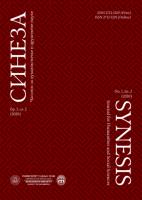Alea iacta est: Цезаров прелазак Рубикона
Alea iacta est: Caesar's crossing of the Rubicon
Author(s): Slobodanka S. PrtijaSubject(s): Cultural history, Ancient World, Philology
Published by: Filozofski fakultet, Univerzitet u Banjoj Luci
Keywords: Caesar; Rubicon; alea iacta est; ancient sources;Menander;
Summary/Abstract: Caesar’s crossing of the Rubicon, a river that separated Cisalpine Gaul from the rest of the Italian Peninsula, in January 49 BC, made history as it meant the beginning of the civil war between Julius Caesar and Pompey the Great, his former ally in the First Triumvirate. The Rubicon marked the border between Cisalpine Gaul, governed by Caesar, and the north-east of Italy. Since crossing the river meant war, the phrase (to) cross the Rubicon became a metaphor for ‘to take an irrevocable step that commits one to a risky course of action’, ‘to pass the point of no return’.This event is mentioned in the extant ancient sources which are, in chronological order, Velleius Paterculus, Lucan, Plutarch, Suetonius, Appian, and the late-antique Orosius. Plutarch, Appian, and Suetonius all mention Caesar’s crossing of the Rubicon, his long consideration before taking the momentous step, and the famous utterance. The Greek historian Plutarch was the first to report that, at this critical moment, Caesar declared loudly in Greek, Ἀνερρίφθω κύβος (Let the die be cast!), and then led his troops across the Rubicon. Both Plutarch and Appian present similar accounts of Caesar’s river crossing in terms of the vocabulary, structure, and content. These similarities suggest that both authors relied, directly or indirectly, on a common source, most likely Asinius Pollio, a Roman politician and historian. ‘Let the die be cast’ (Ἀνερρίφθω κύβος) is an expression meaning roughly ‘let the game begin’, and it comes, according to Ath. 13.559 Е, from the lost comedy entitled Ἀρρηφόρος ἢ Αὐλητρίς (The Flute Girl), written by the Greek playwright Menander in the 4th c. BC.According to Suetonius, after some hesitation at the river, Caesar was given a sign by the gods (ostenta deorum), who sent an apparition playing a reed pipe, which snatched a trumpet from a by-standing soldier and sounded a battle signal. On seeing that, Caesar uttered the famous words, Alea iacta est (The die is cast). This Latin phrase is grammatically different from the ancient Greek Ἀνερρίφθω κύβος(ἀνερρίφθω: imperative perfect mediopassive; iacta est: indicative perfect passive). The expression Alea iacta est has been used as a way of indicating that one has made a move and there is no turning back because the things are now out of one’s hands. In this phrase, the Greek and Latin words κύβοςand alea metaphorically mean ‘an act of risking or state of risk, chance, hazard, gamble, uncertainty; something which involves uncertainty, a risky enterprise or purchase’(OLD, 1968, 94; cf. LSJ, 1996, 1005). So, Gaius Julius Caesar, throwing the die at the Rubicon, made a fateful decision and determined not only the direction of his life, but also the end of the Roman Republic.
Journal: Sineza
- Issue Year: 1/2020
- Issue No: 2
- Page Range: 31-45
- Page Count: 15
- Language: Serbian

